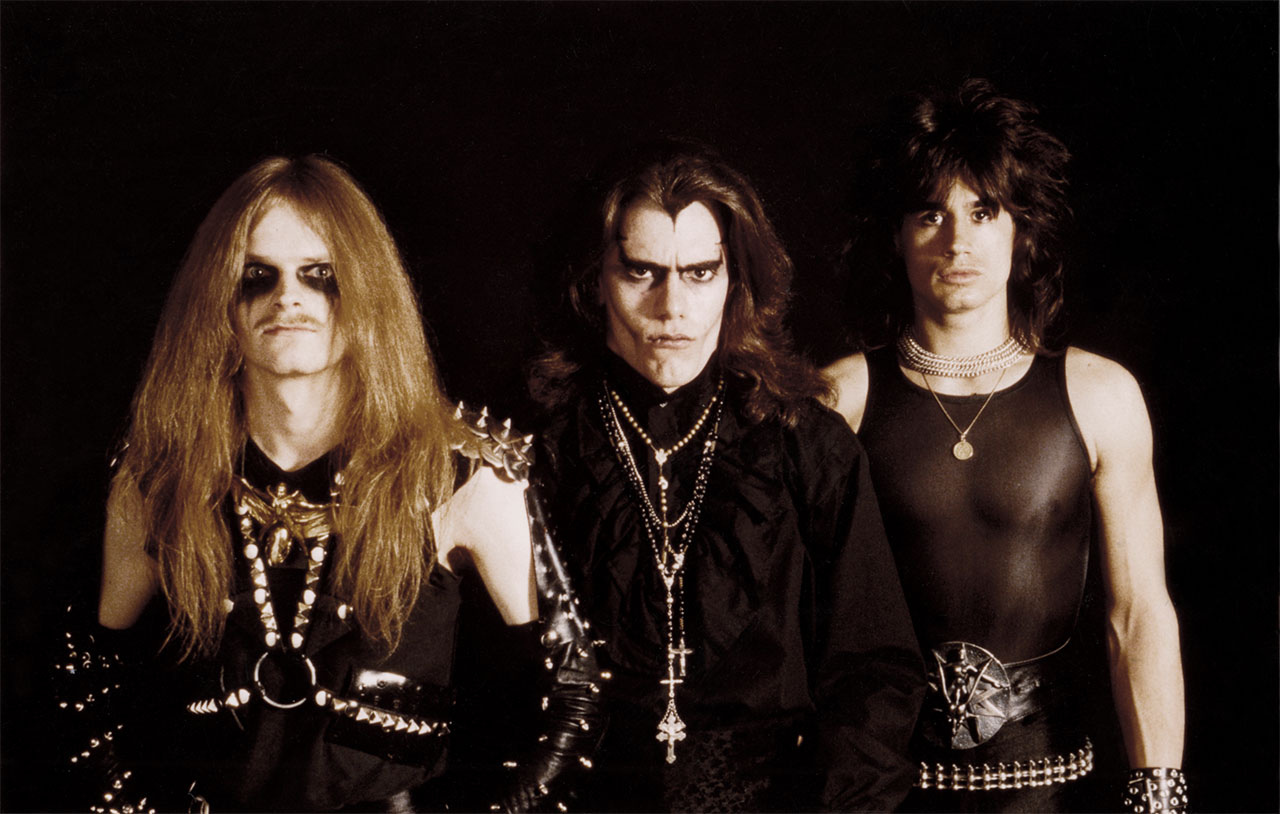The story of Celtic Frost has always been one of battling against the odds. Be it frontman Tom G Fischer’s difficult personal circumstances as a youth (detailed with customary thoroughness and candour in his brilliant, beautifully put together tome, Only Death Is Real) the overwhelmingly negative response Tom’s first band, Hellhammer, received at the time (most famously a 0/100 review published by Metal Forces magazine back in 1984), label contract difficulties, interpersonal issues and more. All of this fed into a band whose turbulent, hyper-alert fusion of thrash, punk and even goth formed much of the tectonic bedrock for underground metal, giving rise one the most potent and inspirational canons in heavy metal history.
Resurrected by BMG, Celtic Frost’s label from the mid-80s to late ‘90s, Noise Records, are releasing much of the the band’s back catalogue – To Mega Therion, In The Pandemonium, Vanity/Nemesis, as well as a compilation, Innocence & Wrath. All available in deluxe CD book and vinyl versions. As beautiful and as information and picture-packed as they are, what’s lacking are sleeve notes from the frontman himself and his final approval, after long-running issues with Noise and the contract he had to sign at the time came to the fore. Tom takes up the story, and below we present his thoughts on a run of timeless albums that have lost none of their resonance today.

“We signed at a disadvantage our contract in the 1980s, like many others, and like many bands do to this day, and so we’ve been used to not having any say in our early albums. We’ve been used, for 35 years, to the fact that we have no rights in our early back catalogue at least, and it’s a common situation. None of us are surprised by this anymore. And this chance to do the reissues came rather surprisingly, and I tried my best to create something very special out of it.
“When I found out last year that Noise were planning on doing a huge reissue campaign, I had my manager contact them and say we are fully aware that Tom has no rights he’s anticipating, but would offer his participation. BMG were very professional and said, yes, let’s do this together. They gave me the final decision on everything. I submitted an extremely detailed concept for the reissues in which everything was mentioned from the advertising to the photos contained to the way it was remastered. I had prepared such a concept for many years, so I was just able to present it to them, and they said, ‘Yeah, let’s do it exactly like in your concept.’ So I was very fortunate to work with such a professional company, and we worked for almost a year on this very constructively until the point came when they reviewed my liner notes.”
We understand they were critical of Noise Records.
“They weren’t even critical. The liner notes weren’t filled with swear words or anything like that, but I wrote dedicated liner notes for each individual album detailing the history of the creation of the albums, and of course with every album the conflicts with Noise Records back in the 1980s increased, and it came to an absolute pinnacle when we did Into The Pandemonium album in 1987. So of course if I write down the history of these albums, these conflicts must be included, because they had a tremendous influence on every aspect of the creation of the albums, and BMG were scared of the idea that this would open them to some kind of defamation lawsuit by the former owner of Noise Records. Legally, of course I totally understand that point, but on the other hand it’s also reality that these conflicts happened, whether you’re either on his side or the band’s side. And also, it’s common knowledge. Almost every Noise band has stated this in 30 years of interviews. So I understood the hesitant attitude of BMG, but on the other hand the information has been out there and at times even Noise’s founder, Karl Walterbuch, has admitted that he had been sometimes making very unfortunate decisions. You know, there are various ways to look at this, but at the end of the day I was simply not prepared as a 53-year-old musician to censor my liner notes.”
It sounds like what you had was a very holistic vision for them. That seems to be the opportunity that’s been lost.
“Exactly, and in my opinion, BMG should have been very happy that the founder of Celtic Frost, the guy who wrote most of the music and all of the lyrics was willing to give them all of this. And Martin and I had tried for many years to obtain at least licensing rights to our music, first with Universal and then with BMG. We tried for years to release reissues on our own label through a licensing deal and they always declined. But the result of this is that for years I had worked on a reissue concept, so I was able to present this to BMG and they didn’t really have to invest any work; I had everything prepared, I had a huge archive of material, I knew exactly in the remastering process where we had to put on work, I knew where the flaws were, and so they really had a very good position, with the minimum of work, to release a fantastic set of Celtic Frost reissues. Now we’ve given away that opportunity, and it will never exist again. That’s really the drawback of it all, that this was a once in a lifetime opportunity, literally.”
None of which is to say that the reissues aren’t worth buying. But we’ll let Tom G Fischer himself take us through the world of Celtic Frost.
Morbid Tales (1984)
“When me and Martin [Eric Ain, guitarist] formed Celtic Frost in the night of May 31 to June 1 of 1984, we sat down that night and we wrote down a very detailed framework of how we wanted the new band to be. We loved the heaviness of Hellhammer and we wanted to retain that, but on top of that we wanted to add much more sophistication and we wanted to have a band that accepts no limits musically or artistically. We didn’t want to be tied down by some clichés or scene conventions. Another factor that was really important, by that time the American metal wave was hitting Europe, and the bands that came from America were incredibly sophisticated in their playing. We knew we could never match that, but we still knew that we would have to compete with them and we knew we had to make an incredible effort to lift Morbid Tales technically beyond what Hellhammer had achieved. And all of these elements are crucial in understanding why Morbid Tales sounds the way it does compared to the Hellhammer EP that was recorded only a handful of months before. We wanted to have a band that would develop tremendously in between the albums. We were complete nobodies at the time. We were ridiculed by the media, and to think that the album we created in this situation became an album, that, 30-odd years later is still being played, that’s an immense honour for two complete outcast kids from Switzerland.”
To Mega Therion (1985)
“It was a really difficult record to make. At the time, in his private life, Martin experienced quite a lot of difficulties, and it reached a level where it became almost impossible for us as a band to work with him. I don’t think there was a way around it, even though it was probably a disastrous decision. But then I was left to write the album largely by myself, I was left in the studio as basically the only founding member of Celtic Frost, and at that time I wasn’t experienced enough to handle the band side of the production alone. So my psychological or emotional frame of mind at the time was very strained. I faced challenges that I wasn’t really ready to surmount, but I had to. Fortunately, right after the recording sessions, we went back to Zurich and we talked to Martin and all three of us knew we had to somehow find a way to work together again. To Mega Therion had proven that we needed him as a member, and luckily we managed to restore the line-up, but the album itself was a huge struggle.”
- Celtic Frost - Reissues album review
- The 10 best Celtic Frost songs by Paradise Lost's Nick Holmes
- Why I Love... Celtic Frost by Mark Tremonti
- Read Classic Rock, Metal Hammer & Prog for free with TeamRock+
Into The Pandemonium (1987)
“Into The Pandemonium was the pinnacle of Celtic Frost’s creativity, up to the release of Monotheist. By that time, through our rather manic work, we had attained finally barely a level of musicianship where we could actually realise all of these things. Martin and I brought into Celtic Frost incredibly diverse influences. He, for example, was deeply immersed in the new wave scene of the time -– Bauhaus, Joy Division and Siouxsie And The Banshees – and I came from new wave, but I also came from a jazz and classical background. I loved the ‘70s prog bands like Emmerson, Lake & Palmer, early Roxy Music and so on, and on Into The Pandemonium we finally felt comfortable enough as musicians to not just have little hints revealing this influences like we did on the previous albums but to actually go full out and write that kind of music. And of course we overstretched ourselves, we went right past our capabilities, but I’m very glad we did this. One can think of the album whatever one wants, and I know it’s a very controversial album for some, but creatively, it was certainly the pinnacle for Celtic Frost until 20 years later.”
Vanity/Nemesis (1990)
“In my opinion, we should have let the band rest after we broke apart in ’87, but at the time I wasn’t seasoned enough, I wasn’t mature enough and probably I wasn’t intelligent enough to realise that. I was driven by desperation. I couldn’t imagine a life without being a musician, and we had struggled so hard to attain the record deal a few years earlier that I was horrified by the vision of having lost Celtic Frost and finding myself without a record deal and no longer being a musician, because this had become my life. So I did the unthinkable mistake of reassembling the band in a hurry with musicians that had nothing to do with Celtic Frost whatsoever out of sheer stupidity, and I recorded an horrific album and an abomination, and having done this, and smarting from this, we tried to consolidate as much as we could from the original Celtic Frost and do an album that would take Celtic Frost back a little closer to its original intent. But of course it was way too little way too late and the band had long lost its spark and identity, and Vanity/Nemesis was simply an attempt to ignore that reality. Because we had been so experimental on Into The Pandemonium and on the abomination, by the time we did Vanity/Nemesis we said, let’s not do any experiments, let’s just record a straight metal album. And of course that’s the last thing Celtic Frost should do. And if I listen to this album now, even though it’s the most modern of these studio albums of the old Celtic Frost, it sounds far more dated than the earlier ones that are older. That really shows that it lacks quality, and in my opinion, it’s a completely irrelevant album. If I had any say, I would not have re-issued it, because really it’s pointless. But BMG wanted to reissue it and I worked on it, but working on it and remastering it only confirmed what I just said. It’s an irrelevant album and Celtic Frost’s legacy could easily be re-told without this album.
“It doesn’t move anything, it doesn’t have the spontaneity or the spark that the earlier albums have. It’s better than Cold Lake, but my mother washing the dishes is better than Cold Lake. It’s a consolidation of a band that’s run out of identity and run out of steam. It’s a desperate album of a band trying to restore a terrible mistake. If you compare it to the fervour of Morbid Tales or the originality of TMT or the audacity of Into The Pandemonium, where does that leave Vanity/Nemesis? It’s like a wet old rag. It’s there, and if a completist fan wants to purchase it because it has the name Celtic Frost on it, so be it. But my recommendation for a fan is don’t bother, spend your money on the other albums because at least you get your money’s worth. V/N is a feeble attempt at saving something that is beyond saving. We should have let the band rest years earlier, as we did later. It did us a lot of good to let the band rest for 16 years or so. We should have realised that earlier.”
Monotheist (2006)
“Celtic Frost eventually dissolved in the early 1990s and I think both Martin and I felt that on the one hand we didn’t want to have anything to do with Celtic Frost at the time because of the way that it ended, but at the same time, given that these last two albums of Celtic Frost were such failures, we always felt that not everything had been said. We always said, this cannot be how Celtic Frost ends. I think we always carried that little spark in ourselves. We always knew that one day we would probably have to talk about it, whether it should be the end or whether we should attempt to resurrect that. But we weren’t in the mood throughout the 1990s, and that was a good thing. We received sometimes incredibly lucrative offers to reform the band for certain festivals. There was this one offer particularly that was monstrously big, and Martin and I talked about it and we decided we were not going to reform Celtic Frost for money. If we ever reform it, it has to be for artistic reasons, and I’m very proud we did this. So we waited a few more years, but eventually in 2001 we met for dinner in Zürich, and we just said, look, we have to attempt at least to provide some kind of artistic conclusion to Celtic Frost that is worth the name. That’s really when Monotheist became a reality from having been in the back of our minds as a concept for many years, but that’s when it became a reality.
“It’s the album that should have followed Into The Pandemonium really. To me it’s different from the other Celtic Frost albums, but then every album is different to the other Celtic Frost albums, that is why it’s a Celtic Frost album. And to me, Monotheist counts as one of the important Celtic Frost albums. To me, there are four albums that Celtic Frost did that are crucial to the band’s history and those are the first three and Monotheist. And I’m extremely glad that we have the guts to do this and we had the patience to work for five-and-a-half years on that album to make it right.”
Celtic Frost’s Noise Records reissues are out now and available from Amazon. There’s also a new two-disc greatest hits package titled Innocence & Wrath available now from Amazon.

